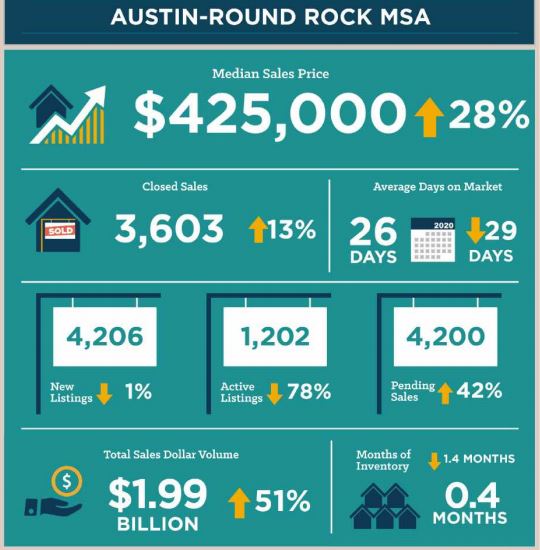AUSTIN, Texas – As Austin experiences growing pains associated with a city transitioning into a large metropolitan area, the Austin-Round Rock MSA continues to set housing records. According to the Austin Board of REALTORS®’ latest Central Texas Housing Report, sales volume lost due to the February storms was recovered in March and the median price for a home in the MSA rose by 28.8% compared to last year, hitting an all-time high of $425,000.
Across the five-county MSA in March, home sales increased 13.1% year over year to 3,603—a record for the month of March. At the same time, active listings plummeted 78.3% to 1,202 listings, keeping housing inventory at a record-low 0.4 months of inventory, or 1.4 fewer months than in March 2020.
“The Austin-Round Rock MSA is one of the fastest growing in the country, people want to live here, and job creators see opportunity to be successful here,” Susan Horton, 2021 ABoR President, said. “Austin is investing in infrastructure and businesses are working to harness this growth and opportunity, but with opportunity comes challenges. Our housing market is undergoing growing pains and creating a paradox—affordable from the outside looking in, but increasingly unaffordable for those who already call Austin home. While more homes are selling than ever before, it’s more and more difficult to find one.”
In March, sales dollar volume jumped by 51.6% to $1,997,794,869, new listings fell 1.3% to 4,206 new listings and pending sales increased 42.8% to 4,200 pending sales. Homes spent half as much time on the market (52.7%) as in March 2020, selling in 26 days on average.

Dr. Jim Gaines, an economist at the Real Estate Research Center at Texas A&M University, stated that rapid home price growth and shrinking housing inventory levels are impacting housing markets across major metros in Texas and nationally.
“While Austin leads the state in home price growth, this trend is also happening in Houston, Dallas-Fort Worth and San Antonio due to high demand and limited housing supply. For a market that has experienced several decades of strong population and employment growth, significant gains in both sales activity and housing costs across the region are to be expected as Austin expands into a large metropolitan area.”
Gaines added that Austin’s housing demand is benefiting from historically being less expensive than other major metropolitan areas across the country.
“Austin real estate is still a bargain by national standards. Compared to similarly competitive markets in cities like Denver and Atlanta, which are also experiencing rapid population and home price growth, Austin is coming from a stronger position in terms of affordability. There is a reason so many transplants, especially from the east and west coasts, are coming to Austin; they can buy more house for their money than what they could in the cities they are leaving behind.”
Despite the tight market conditions in Austin, Horton stated there are opportunities in the region for potential buyers and renters, if you have a REALTOR® to guide you through the process.
“With an average closing price of 108% of list price across the Austin area, the decades-old expectations of submitting a lower offer and negotiating up is no longer a reality. Homebuyers and renters must carefully weigh costs, location, and housing features to determine what’s essential and where there is flexibility for tradeoffs. Your REALTOR® can help you weigh those options, set clear expectations on what’s feasible and manage complex negotiations on your behalf when an offer is accepted.”
City of Austin
In March, the median sales price in the city of Austin jumped 24.8% to $514,000—an all-time high for any month on record for the city of Austin. Residential sales increased 11.6% to 1,137 sales and sales dollar volume increased 46.1% to $755,212,253. At the same time, new listings rose 1.4% year over year to 1,420 listings while active listings dropped 66% to 449 listings. Pending sales climbed 55.4% to 1,420 pending sales as monthly housing inventory decreased 0.9 months year over year to 0.4 months of inventory.
Travis County
In Travis County, residential sales increased 12.4% to 1,785 sales, while sales dollar volume rose 50.3% to $1,204,798,018. The median price for residential homes increased 24.1% year over year to $490,000 as new listings declined 3.9% to 2,143 listings. Active listings plummeted 73.1% to 669 listings and pending sales skyrocketed 51.4% to 2,149 pending sales. Monthly housing inventory fell 1.1 months year over year to 0.4 months of inventory.
Williamson County
In March in Williamson County, residential sales increased 10.6% to 1,206 sales, and sales dollar volume climbed 52.9% to $533,395,535. The median price increased 40.4% to $400,000. During the same period, new listings ticked down 0.7% to 1,359 listings, while active listings tumbled 85.6% to 260 listings. Pending sales increased 32.3% to 1,360 pending sales. Housing inventory declined 1.5 months year over year to 0.2 months of inventory.
Hays County
In Hays County, March home sales steadily increased 5.4% to 412 sales, and sales dollar volume increased 44.7% to $194,169,038. The median price for homes increased 25% to $350,000. During the same period, new listings increased 10.9% to 538 listings, while active listings fell 78.1% to 180 listings. Compared to March 2020, pending sales increased 34% to 509 pending sales. Housing inventory decreased by 2.0 months to 0.4 months of inventory.
Bastrop County
In March, Bastrop County home sales increased 83.2% to 163 sales, and sales dollar volume skyrocketed 104.8% to $51,605,144. The median price for residential homes ticked up 5.8% to $276,000. During the same period, new listings declined 8.9% to 133 listings, while active listings fell 81.1% to 63 listings. Pending sales increased 61.5% to 147 pending sales. Housing inventory decreased by 3.0 months to 0.5 months of inventory.
Caldwell County
In Caldwell County, March home sales increased 27.6% to 37 sales, and sales dollar volume climbed 57.4% to $12,406,269. The median home price increased 10.1% year over year to $250,000. During the same period, new listings fell 2.9% to 33 listings, while active listings dropped 67.4% to 30 listings. Pending sales jumped 45.8% to 35 pending sales. Housing inventory decreased 2.5 months year over year to 1.0 months of inventory.
For more information or to download the March 2021 Central Texas Housing Market Report, visit ABoR.com/MarketStatistics.

